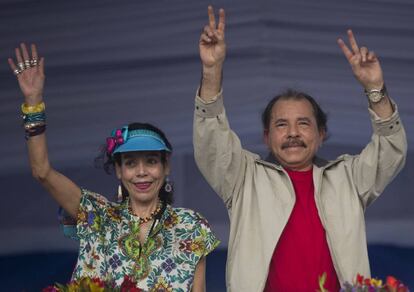Nicaragua’s Daniel Ortega shows his true colors
Since taking office in 2007, the president has concentrated power in his family’s hands

Nicaragua’s president, Daniel Ortega, has taken another step in his move toward totalitarianism. In June, the leader of the ruling Sandinista party took measures to clear the path toward his third consecutive mandate in November’s elections by ensuring that the Supreme Court annulled the candidacy of his rival Luis Callejas, thus forcing the opposition to withdraw. Shortly before, he made sure that the elections would not be monitored by international observers. But last week he sunk to a new low by announcing that his wife, Rosario Murillo would be running as vice president, assuring that power would remain in his family. In doing so, he revives the tradition installed by the Somoza family he fought against in the 1970s.
Ortega played a key role in the 1979 revolution that overthrew Somoza, whose family had been in power for half a century and that had kept Nicaragua in poverty. The Sandinista revolution created the hope of justice and prosperity for this Central American nation. Those hopes were soon dashed as the country was plunged into civil war. In 1990, the Sandinistas lost democratic elections and stepped aside.
Since returning to office in 2007, Ortega has made it clear he intends to hold on to power. He has changed the Constitution to allow himself to restand indefinitely, has placed his children in key positions allowing him to control the country’s finances and media, he has cozied up to the Catholic Church, and adopted the kind of bombastic rhetoric used by Hugo Chávez in Venezuela.
Nicaragua is one of the fastest-growing economies in Central America and also one of the safest. But this doesn’t justify converting the country into the personal fiefdom of a corrupt family.
Sign up for our newsletter
EL PAÍS English Edition has launched a weekly newsletter. Sign up today to receive a selection of our best stories in your inbox every Saturday morning. For full details about how to subscribe, click here
English version by Nick Lyne.
Tu suscripción se está usando en otro dispositivo
¿Quieres añadir otro usuario a tu suscripción?
Si continúas leyendo en este dispositivo, no se podrá leer en el otro.
FlechaTu suscripción se está usando en otro dispositivo y solo puedes acceder a EL PAÍS desde un dispositivo a la vez.
Si quieres compartir tu cuenta, cambia tu suscripción a la modalidad Premium, así podrás añadir otro usuario. Cada uno accederá con su propia cuenta de email, lo que os permitirá personalizar vuestra experiencia en EL PAÍS.
En el caso de no saber quién está usando tu cuenta, te recomendamos cambiar tu contraseña aquí.
Si decides continuar compartiendo tu cuenta, este mensaje se mostrará en tu dispositivo y en el de la otra persona que está usando tu cuenta de forma indefinida, afectando a tu experiencia de lectura. Puedes consultar aquí los términos y condiciones de la suscripción digital.







































